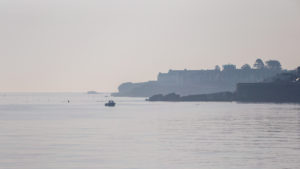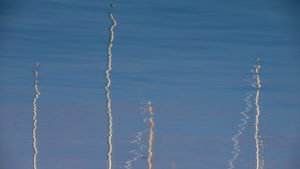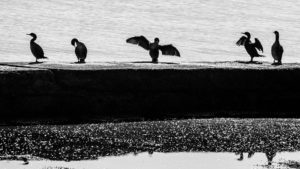This is the two hundreth consecutive daily blog and I think it’s a great achievement considering it has been done without incentivisation.

Coast Mist 
Masts Reflected 
Cormorants not Shags.
I’m not sure I knew what I was committing to when I started. I’m not even sure I know what I’m doing now. I do know that while I’m not short of ideas, I’m running out of enthusiasm. Besides, I’m stagnating with the lack of social interaction and the natural feedback such communication brings. These lacunae have taken the edge from my appetite to continue. I will continue but it’s likely to peter out, fade away. Daily may become weekly. Weakly.
I’m unsure and uncertainty is the mark of these times. A vital part of the fuel mix of my curiosity is the mental stimulation I used to get from our friends, my colleagues, the arts, the restaurants, the mountains, the seas, the journeys, the changes in scenery and culture. Pandemics are bad for us in so many different ways.
Masks and uncertainty, fear and division may well be suppressible with vision and plans. We watched the president of the European Commission, Ursula von der Leyen, give her first State of Union speech this morning. She was clearly focussed on health issues rather than the migration topic that dominated Jean-Claude Junker’s time in office. And she went big on climate. I switched from thinking about climate ‘change’ to ‘climate justice’ perhaps a year ago. My switch was necessary because my geological training means that climate change is in my thoughts every day.
I look out at the ice shaped hills and I think the climate has indeed warmed since the hills were last ice rounded ten thousand years ago. I look at the rocks and see that the water levels have changed because the fossils are deep sea creatures. This is geological time and I needed a way to separate the changes in climate from blame and guilt.
I was watching the protests in the UK last year and there were various placards about climate justice. I had understood Mary Robinson’s book on Climate Justice had educated me to understand that the changes in climate threatens human rights and development and that we should be striving to safeguard the rights of the vulnerable nations and people.
Now, I realise the climate debate is not really about any of those things even though it’s about all of them. It’s really about taking back control, the mantra once misused for Brexit and yet so appropriate for the planet.
However, if you believe in having balanced views, there may be an inconvenient story to hear. I’m a member of the EAGE (European Association of Geoscientists and Engineers) and still read the monthly First Break magazine. The September edition has the usual opinion Crosstalk piece by Andrew McBarnet that I look forward to each month. This month he quotes a Canadian energy commentator Geoffrey Cann who has ‘noted that after the pandemic there will still be 1.2 billion gasoline cars on the world’s roads, 300 million heavy trucks hauling goods to market, 53,000 merchant and military ships plying the world’s oceans, 30,000 aircraft flying the unfriendly skies, and 697 refineries around the world capable to process north of 100 million barrels of oil every day.’
‘What is remarkable,’ Cann states, ‘is the resilience (so far), of the world’s energy delivery systems which stands in sharp contrast to the fragility of the healthcare system, the collapse of the retail sector, the gutting of the tourism sector, the stalling of the services industry. Our energy systems are built to last, and frankly, during a pandemic, society is most grateful that this is the case’.
I can’t attest to the accuracy of the numbers mentioned by Cann but that’s hardly the point. I worked in the oil and gas industry for over forty years and I know that the industry continues to keep the lights on in homes, schoolrooms and hospitals across the globe.
von der Leyen used the word ‘fragile’ several times in the context of the planet. Another inconvenient truth is that the tiny virus exposed the fragility of both life itself and the structures of the societies that reside on the planet. It’s not just within the EU that treaties and agreements and structures and markets have been weakened by the virus.
There is no doubt in my mind that climate science has made major advances in the last two decades and while the science helps us better understand the challenge, we need to frame the goals in words that are not divisive.
von der Leyen has committed the EU as a matter of policy to certain goals. Perhaps what we need to focus on is ‘why’? And if you think ‘why’, it may be that history will say her ambitions fell well short of what was required.
Carbon neutrality in 2050 may be too late. And yet if policies are to become more aggressive, the 50% of the 2050 population as yet unborn in 2020 may well be disadvantaged. This is why I suggest global thinking and cooperation may be required.
Perhaps a place to start is by mandating that leaders who work on directing such policies should have a remaining life expectancy that will enable them be held accountable in 2050. Austria, Finland, Mali, North Korea, El Salvador, New Zealand, Qatar and Guyana are eight countries where young leaders are running their countries.
Perhaps The Elders could advise?

Intergenerational discussion?
As for lack of interaction due to Covid, at least we still have books – and you’re putting them to such good use here. Thanks for that.